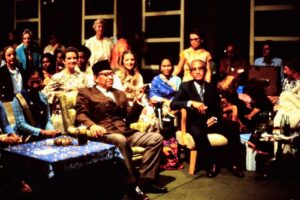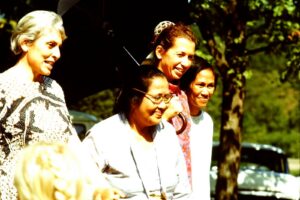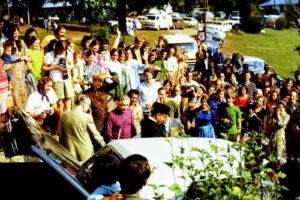Qadar and Latihan
As Bapak has said before, the power that works in the latihan kedjiwaan is also the Qadar from God, for it is present not because you will it or strive for it but only because you surrender to the One God. Only through surrendering to God are you able to receive even the outer expression, the form, the cover or skin of the Qadar. At present you receive movement and energy. You make various kinds of movement, but not because you decide to. That is, so to say, the outer form, the wrapping, the skin. The content is the Qadar of God. So follow the way of the latihan, which you have received, with patience, trustful acceptance and sincere submission. And you also need to practice fasting every year, so that you can receive the content of what you have received in the latihan. Bapak does not say definitely that if you keep the fast you are sure to receive it; no. But the fact is that this fast will make you able to receive it. So it was in Bapak’s own experience. Bapak’s first receiving happened to be in the month of Ramadhan, after twenty days of fasting. Bapak says it “happened” that way because he did not know why it was so. And Bapak’s receiving stopped on the day of the feast (at the end of Ramadhan.) So after thirty days of fasting, what Bapak had received came to an end, and he later channeled it to other brothers and sisters. Thus, as Bapak said before, what we call traditions-which are only followed as a matter of custom-have causes which we really should know. One cannot come to know the inner, the feeling, without receiving the Qadar of God. Thus what we experience in the latihan kedjiwaan just touches the outside, the skin. It does not yet reach the content. The content is what we need, and the content is the Qadar of Almighty God . Plainly, brothers and sisters you are still a long way from this in your latihan kedjiwaan; and you need to go on doing the latihan, because its content-the Qadar-is from Almighty God. So beside doing your latihan faithfully you need also to fast.
Tjilandak 11/71
This is how it is, brothers and sisters, and so it is very useful for people to do this fast. And it really is right to take as an example and it really is right to follow what has been said by those who have received, the people who have been able to receive the Qadar from God.
Well, brothers and sisters, these are the benefits and the results of the fast you have been doing. It does not matter if you have not yet been aware of its benefits or results. For probably the fast you have been doing cannot yet be counted as a hundred per cent fast, but is still just ten per cent or five percent. Thus the Qadar is still slight.
But even so, brothers and sisters, don’t think that if that is all it amounts to, that it would be better not to fast. Don’t be like that. Little by little we add to it. If we add five percent to five per cent, and do that ten times, it comes to fifty per cent. that is and example of how it may be. That may be hoped for.
Brothers and Sisters, the fact of the matter is that development is always going on, and we must have it in us. If a thing lacks development, then it is something that will not change, for this something is characterized by apathy. It is like a stone that is always there, year after year. If it is like that, it means that the course of the era comes to a halt.
So as time goes on, as this century goes by and for the centuries to come, there must always be development, and we must keep pace with it. That is how it is, brothers and sisters; and this building up is no new thing, but is really a necessity for mankind. For God never stops building. If God stops building, there would be no progress. Because of this, brothers and sisters, don’t fall back. We must go forward. We must develop; develop everything needed for our life in this world.
So, clearly then, brothers and sisters, this developing is a quality of the human self, if people will put it into practice and really put their inner feeling to the test. And the way to put it to the test and to put it into practice is, for the people of Islam, the fast.
Thus this fast, brothers and sisters, truly is to test us, truly is to be put into practice, so that we may be able to receive and feel what we ought to do, and also what is that foundation of our inner feeling that is usually called one’s talent. One will not be able to discover one’s talent, or be able to know what it is, if one does not carry out or make any practical test of one’s own self. The way to test one’s self, as Bapak repeats once more, is through the fast.
Like a Rusty Knife
Thus the fast is something important for your lives, for our lives-meaning that prihatin is important for life. Avoiding the fast, avoiding prihatin means that we are like a knife that we never sharpen, or like clothes that we never wash. It is just like that. Thus after a while the clothes actually smell, smell bad; after a time the knife rusts. Once the clothes smell or the knife is rusty then no-one else, and not even oneself, will want to use them, will want to posses them. This is how it is, brothers and sisters.
Hence many people become irritated and fed up with themselves, and resentful about, for instance, how business is always bad, how the cooking is never any good, how they can never look nice, hard though they try-that sort of thing.
Why is this? Because of what has just been said. They never put themselves to the test, never give their inner feeling any practice. And the way to give the inner feeling practice and to test it is the way Bapak has just been speaking about-through fasting and prihatin.
That is how it is, brothers and sisters; so we already have something like an instinct that we are, as it were, obliged to fast every Ramadhan; and this is a lesson, a reminder, that is not only important but truly useful for our lives.
But, brothers and sisters, as Bapak has just said, don’t then just fast for fasting’s sake, which means you think you are fasting so long as you do not eat or drink-but that you can have a drink if you are thirsty. Don’t do that. The fast must be done properly, even though it is not done, say, for the whole of the thirty days. Yes, it may be for ten days, but it must be a proper fast. Thus if you do fast you will feel it, you will feel it. Bapak will show you a little about this later on, brothers and sisters.
Bapak uses the words puasa (fast) and prihatin (self-denial.) Puasa and prihatin mean the same. Only, to fast every Monday and Thursday by way of prihatin is called a minor prihatin, whereas to fast in the month of Ramadhan is a major prihatin. That means fasting for the whole month, the full thirty days.
The will of God for mankind, as it has been decreed, is that it is enough if people do their prihatin-that is, the fast-for one month in the year. Thus out of the twelve months, one is used for prihatin. That is enough.
So God wills that people should not force themselves by fasting and really doing prihatin all the time, by the seashore or in the mountains or on top of a mountain. It is enough if people fast for one month in the year. Just that.










